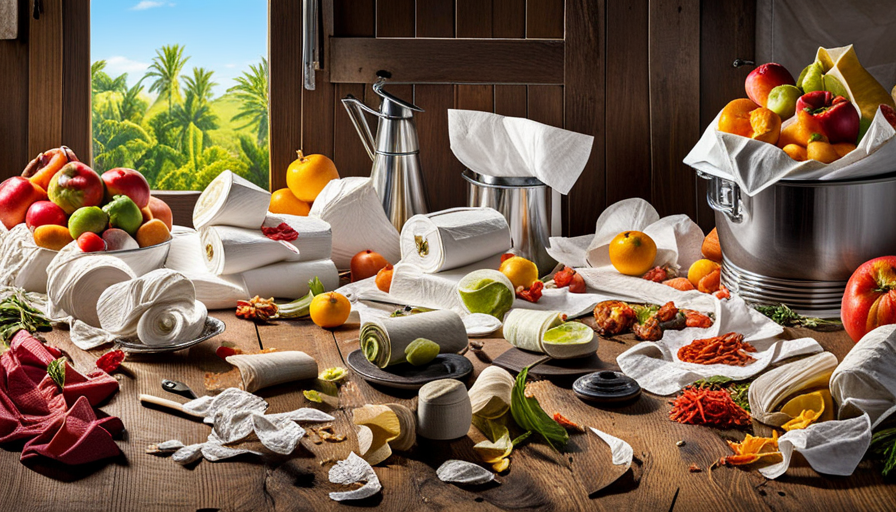Are you wondering if you can add tissues to your compost pile? Well, let’s get down to brass tacks and figure out what you should do with those snotty tissues. After all, you don’t want to be caught between a rock and a hard place when it comes to composting.
Firstly, before we dive into whether or not tissues are compostable, let’s make sure we’re on the same page. You know the saying ‘apples and oranges’? Well, comparing regular tissues with compostable ones is like comparing apples and oranges – they’re just not the same thing!
So, it’s important to understand the difference between these two types of tissues before deciding whether or not they can be added to your compost bin.
Key Takeaways
- Compostable tissues are a more environmentally friendly option than non-compostable tissues.
- Tissues made from natural fibers without additives like fragrances are the best option for composting.
- Facial tissue is not recommended for composting due to synthetic fibers.
- Proper composting of tissue waste can contribute to the health of garden soil.
Understanding the Difference Between Compostable and Regular Tissues
Did you know that compostable tissue options are a great alternative to regular tissues? They’re made with environmentally friendly materials and break down easily. Plus, they can be added directly to your compost pile.
This means that instead of throwing away your tissues after use, you can turn them into nutrient-rich soil for your garden. On the other hand, non-compostable tissues have a negative impact on the environment.
Since they don’t break down easily and end up in landfills, they contribute to the buildup of waste and take up valuable space. By choosing to use compostable tissues, you’re not only making a more sustainable choice for yourself but also helping reduce overall waste production.
So next time you reach for a tissue, consider opting for a compostable option instead!
Choosing the Right Tissues for Composting
When you’re selecting the type of paper products to dispose of in your compost bin, it’s important to consider which ones will break down easily. Opting for eco-friendly materials and biodegradable options is the best way to ensure that your tissues will decompose quickly and efficiently.
Look for tissues made from recycled content or those labeled as ‘compostable’ or ‘biodegradable.’ These types of tissues are designed to break down naturally over time, without leaving behind harmful chemicals or synthetic fibers.
Avoid using tissues that contain additives like fragrances, lotions, or other synthetic materials. These substances can make it more difficult for the tissue to fully decompose, and may even contaminate your compost pile with toxins.
Stick to plain white tissues made from natural fibers like bamboo, hemp, or organic cotton. By choosing the right tissues for composting, you’ll not only reduce waste but also create nutrient-rich soil that can be used in your garden or container plants!
How to Compost Tissues Properly
To properly turn your tissue waste into garden gold, it’s important to follow a few simple steps.
Firstly, make sure that you shred or tear the tissues into smaller pieces so that they break down more easily. This will help speed up the composting process and prevent any clumps from forming in your compost pile.
Additionally, consider using compostable tissue alternatives like bamboo or recycled paper tissues. These options are made from sustainable materials and can be easily broken down in a compost pile without causing harm to the environment.
By composting tissues instead of throwing them away, you’re not only reducing the amount of waste sent to landfills but also creating nutrient-rich soil for your garden.
So don’t hesitate to start incorporating your used tissues into your compost pile today!
Common Mistakes to Avoid When Composting Tissues
Don’t let your efforts to create nutrient-rich soil for your garden go to waste by making common mistakes when composting tissue waste. It’s important to be aware of which tissue types can and cannot be composted.
Composting facial tissue, for example, is not recommended as it often contains synthetic fibers that do not break down easily in the composting process.
Another mistake to avoid is adding too much tissue waste at once. This can lead to an imbalance in the carbon-to-nitrogen ratio, which is crucial for successful composting. To avoid this, add a small amount of tissue waste at a time and mix it well with other organic materials such as food scraps and yard waste.
By avoiding these common mistakes, you can ensure that your tissue waste is being properly composted and contributing to the health of your garden soil.
Frequently Asked Questions
Can I compost tissues that have been used to blow my nose?
Maintaining composting hygiene is vital for a sustainable environment. However, using tissues to blow your nose can negatively impact the compost quality and attract pests. It’s best to dispose of used tissues in the trash instead.
Are tissues made from recycled paper suitable for composting?
Tissues made from recycled paper are suitable for composting as long as they’re not contaminated with chemicals or bodily fluids. Consider the paper quality and environmental impact before composting to ensure proper decomposition.
How long does it take for tissues to break down in the compost?
To compost tissues, understanding decomposition time is key. It takes about 2-4 weeks for tissues to break down in the compost. However, it’s important to consider the environmental impact of adding them to your pile.
Is it safe to compost tissues that have been contaminated with bodily fluids?
When it comes to composting safety, it’s best to avoid tissues contaminated with bodily fluids. Instead, consider other tissue disposal options like throwing them in the trash or using a separate compost bin for non-contaminated tissues.
Can tissues with lotion or other added ingredients be composted?
Yes, you can compost tissues with lotion or other added ingredients. However, keep in mind that the biodegradability of these tissues may vary depending on the specific ingredients used.

